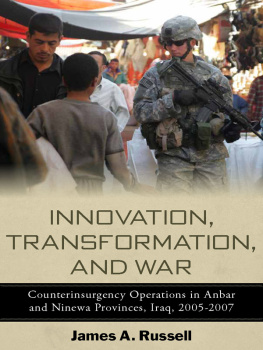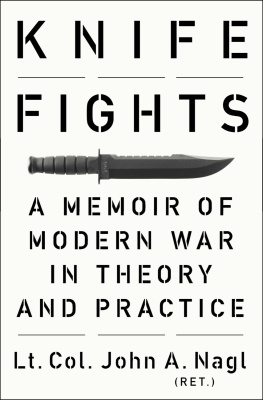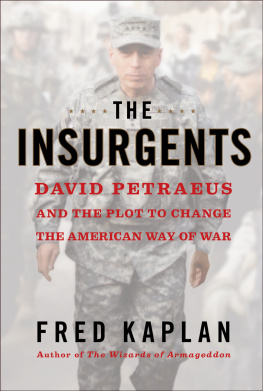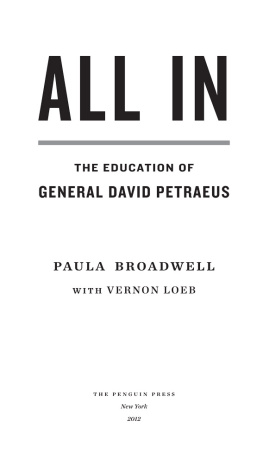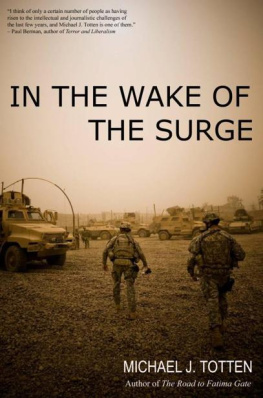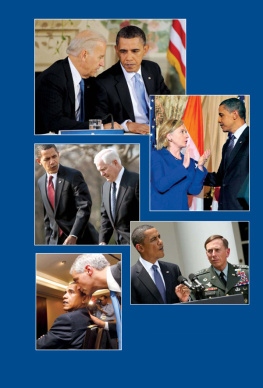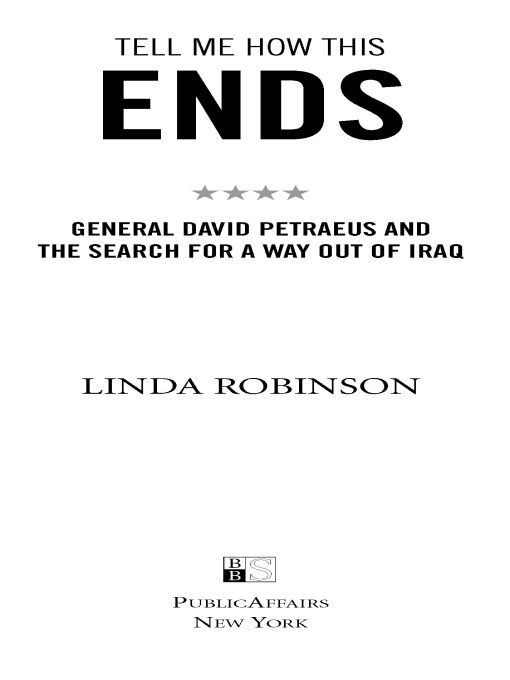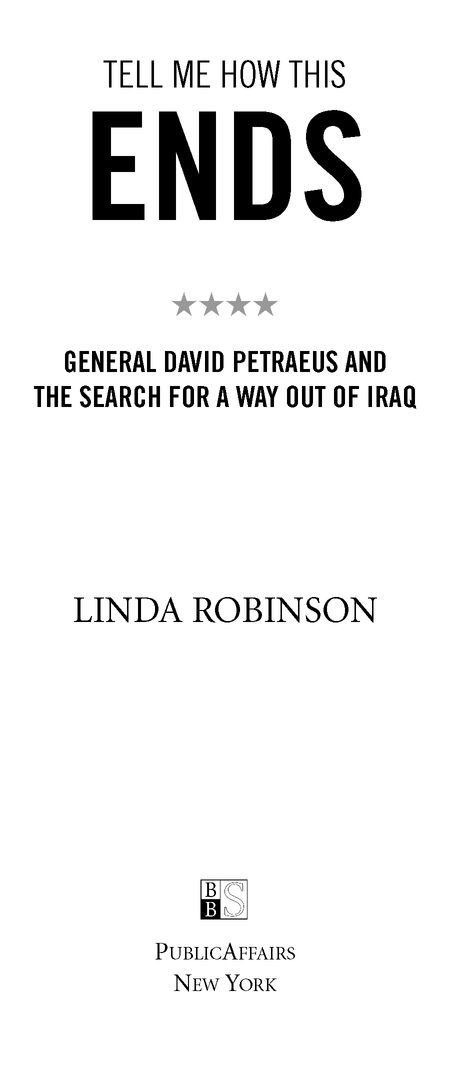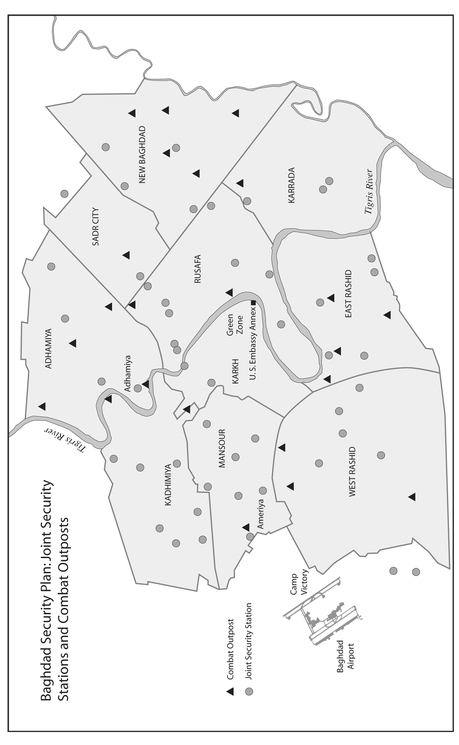Table of Contents
FOR THOSE WHO GAVE THEIR LIVES TO HELP IRAQ
THE SHIA ARE AFRAID OF THE PAST,
THE SUNNIS ARE AFRAID OF THE FUTURE,
AND THE KURDS ARE AFRAID OF
BOTH THE PAST AND THE FUTURE.
HOSHYAR ZEBARI
Preface
Most of the books written about the Iraq war thus far focus on decision to go to war and the first three years, from 2003 to 2005. The largely unhappy experience of those years soured the American public on a war it once supported and that it had been led to believe would be as short and cheap as the limited and relatively bloodless interventions, proxy wars, and peacekeeping missions the United States had undertaken in the past twenty-five years. Instead, America has stumbled into a war that resembles Vietnam more than any other previous conflict, in terms of both the blood and treasure expended and the irregular nature of the combat. Homemade bombs of a dizzying variety have been the American adversaries wea-pon of choice in Iraq, wielded with devastating effect. As of this writing, over 4,000 Americans have been killed and 29,000 wounded. Tens of thousands of Iraqis have died and many more have been injured.
This book has four purposes. It aims first to distill the central dynamic, major inflection points and lessons of the wars early years. Second, the book provides a comprehensive account of the latter phase of the war, from 2006 to the present. It examines the approach Gen. David Petraeus adopted, the thinking behind it, and the results it produced. Third, unlike most books, which have focused on either the military or the political aspects, this account covers both facets of the conflict. Finally, the book analyzes the options available to the next administration and suggests the most viable approaches.
The book traces the deepening war in 2006, the administrations decision to adopt a new approach, and the career of the general appointed to lead it. David Petraeus had served two tours in Iraq and then overseen the writing of a new Army-Marine Corps counterinsurgency manual, as the military grappled with the failures in Iraq and more generally the challenges of irregular warfare. Well aware that Americans patience was ebbing, Petraeus returned to Iraq to develop a political-military strategy that would integrate civilian and military efforts in a simultaneous bottom-up and top-down campaign. His leadership of the so-called surge of 2007-08 is recounted from the strategic and operational level to its implementation throughout Baghdad, which was declared to be the main effort since most violence was occurring there. The Baghdad security plans design and execution by U.S. and Iraqi units is chronicled in detail, including the experiences of 1st Battalion, 26th Infantry Regiment, and 1st Battalion, 5th Cavalry Regiment, in two of Baghdads most violent neighborhoods.
Petraeus and his strategists believed the political causes of the conflict had to be addressed to end the war, which meant focusing all lines of operation on this goal. This concept applied to all military units down to the tactical units on the ground, but also to the diplomats and other civilians involved in the effort. Ambassador Ryan Crocker and the embassy team were central actors in developing the strategy and carrying it out.
Iraqs political leaders, parties, and ordinary citizens are fighting over how their country is to be governed and, indeed, whether it will continue to exist at all. The book aims to provide insight into the motivations and interactions among the political parties and leaders who have found it so very difficult to decide whether and how they will lead their country into the future.
The reason for adopting such a broad approach is to pay more than lip service to the notion that war is a profoundly political phenomenon, especially wars such as this one. To understand the war it is necessary to understand the issues at stake. To succeed, a strategy must address those causes with appropriate measures and adequate resources. The book examines how military and nonmilitary resources and influence have been applied, are being applied, and might be applied to produce the political solution that is widely considered to be the wars only true exit strategy.
The war in Iraq is not yet over, and even when the fighting does finally end the political situation is likely to remain fluid for some time. Iran and other outside actors remain involved in the contest. If war, according to Prussian military strategist Carl von Clausewitz, is the conduct of politics by other means, then the best hope for Iraq is for politics to become the preferred means of fighting the wars final battles.
The Genesis of a Civil War
Two days after the fall of Baghdad on April 9, 2003, the head of the CIAs Middle East Division, Rob Richer, was on the ground, driving around the sprawling, dun-colored city in an armored car with the station chief. Iron rebar jutted from bombed government buildings, and looters moved over the landscape like locusts. Over beer and hot dogs with Gen. John Abizaid and other generals, Richer was surprised to hear the war-fighters talking of going home. Central Command chief Tommy Franks had announced his retirement, and the army land forces commander based in Kuwait, David McKiernan, would soon pack up. Jay Garner, the Pentagon-appointed head of the Office of Reconstruction and Humanitarian Assistance, showed up, only to be replaced within days by Paul Bremer and the Coalition Provisional Authority (CPA).
On subsequent trips over the coming months, Richer saw and heard why the CPA acquired the nickname Cant Provide Anything. Richer saw schools without teachers, the creeping influence of Iran in southern Iraq, and little electricity anywhere. The CPAs outpost in Hilla, a city south of Baghdad, had to buy its own generators on the black market. Back in Washington, no one really knew what Bremer was doing. His counterpart would call from the State Department and ask Richer, Have you seen anything? Bremer rarely sent cables, maybe one every ten days, and the ones he did send, Richer recalled, were not substantive, and unbelievably positive.
With the lid popped off of the Iraqi dictatorship, the centrifugal forces were destined to grow among the countrys fractured and oppressed population. Saddam Husseins regime had disproportionately empowered the roughly 20 percent of the Sunni Arab population, most of all his own kin, although the secular socialist Baath Party apparatus contained many Shia as well. He had viciously repressed the Shia Arab majority, particularly after the 1991 uprising that followed the first Gulf war. Saddam had also waged a genocidal campaign against the Kurds, Iraqs third major population group, who had long agitated for their own state. The remaining Iraqis were a kaleidoscopic array of Turkomans, Assyrians, Chaldeans, Yezidis, and others.
Iraq was not only the cradle of civilization, Mesopotamia, as school-children the world around were taught to call the area between the Euphrates and Tigris rivers. It was also the cradle of Shia Islam and one of the few Arab countries where Shia Islam was the dominant religion. Majority rule in the post-Saddam Iraq would inevitably bring the Shia majority into power for the first time in the Arab world. What was unknown, since the secular Baathist rule had lasted for thirty-five years, was how potent a political force Shia Islam would become. All the parties together polled less than 10 percent support in 2003. Historically, the two main Shia Islamist parties had been outlawed, driven underground, and persecuted, along with all other rivals to the Baath Party. Also, the Shia religious hierarchy had espoused a different vision from the theocratic state, in which mullahs ruled, that the Iranian revolution had implanted next door in Shia Persia.


